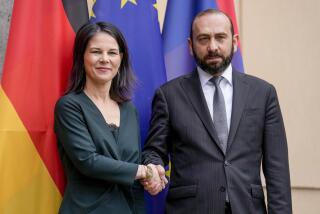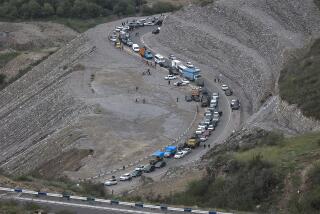Macedonia Talks Focus on Reforms
- Share via
BELGRADE, Yugoslavia — Macedonian leaders began talks Monday on a Western-drafted framework for political reforms aimed at defusing an ethnic Albanian insurgency that threatens to plunge the Balkan nation into civil war.
Although ethnic Albanian politicians have said the proposals are inadequate, American and European Union representatives were upbeat after the first round of negotiations.
“All parties are committed to working productively with the document, so we are very pleased with the first meeting,” U.S. envoy James Pardew told reporters in Skopje, the Macedonian capital.
EU envoy Francois Leotard called the discussions “very positive.”
Negotiators for the two sides, however, said the talks were difficult.
If ethnic Albanian and majority Macedonian Slav political leaders can agree on constitutional reforms and other issues, guerrilla leaders will be asked to sign on to a peace deal and to disarm. The North Atlantic Treaty Organization recently approved a standby plan for deploying 3,000 soldiers to help with disarmament.
The guerrillas say they are simply fighting for equal rights. But Macedonian Slav politicians charge that the rebels want to split the country.
Key ethnic Albanian leaders are part of a national unity government formed to deal with the crisis, but some of them openly acknowledge that the insurrection has increased their bargaining power. Still, if they accept a deal judged insufficient by many of their constituents, leadership of the ethnic Albanian community could pass from these peace-oriented politicians to the guerrillas.
Macedonian Slav politicians also are afraid that if they give away too much, they will lose voter support.
The talks are taking place as a cease-fire, which began Friday, appeared to hold. The rebels told reporters Monday that one guerrilla had been killed in an overnight clash near the northwestern city of Tetovo.
The relative peace has prompted some of an estimated 110,000 people who have fled contested areas during nearly five months of fighting to start returning home. The U.N. refugee agency reported Monday that 9,000 ethnic Albanians had returned to Macedonia from the neighboring Yugoslav province of Kosovo in the last few days.
Ethnic Albanian politicians in the government have warned that the concessions offered in the draft framework do not go far enough.
“The Macedonians are denying what is important for us,” Arben Xhaferi, the country’s leading ethnic Albanian politician, said after Monday’s talks. “The Macedonian side has fears, but those fears are not realistic--we are not jeopardizing vital interests of the state.”
Nikola Popovski, a representative of the Macedonian Slav side, called the negotiations “rather difficult, with considerable pressure from the international community on all sides.”
Although the Western-drafted proposal has not been officially released, it reportedly would make Albanian an official language and provide for stronger local governments, which would allow ethnic Albanians to exercise more control in their own communities.
Heavily ethnic Albanian parts of the country are in the west and northwest, near Albania and Kosovo, which lies in Serbia, Yugoslavia’s dominant republic. Ethnic Albanians make up at least a quarter of Macedonia’s 2 million people.
Ethnic Albanian politicians have demanded that the constitution be revised so that some decisions would require approval not just by a majority of parliament, but also by a majority of its ethnic Albanian members. The framework under discussion is reported to address that issue--but not far enough to satisfy ethnic Albanian leaders.
Ethnic Albanian parties hold 25 of the 120 seats in parliament. Ethnic Albanian leaders say they need a mechanism to avoid being constantly outvoted by the Slavic majority.
More to Read
Sign up for Essential California
The most important California stories and recommendations in your inbox every morning.
You may occasionally receive promotional content from the Los Angeles Times.













